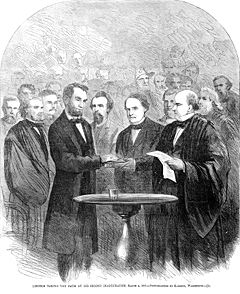Second inauguration of Abraham Lincoln

Lincoln taking the oath at his second inauguration. Chief Justice Salmon P. Chase administering oath of office.
|
|
| Date | March 4, 1865 |
|---|---|
| Location |
Washington, D.C. the Capitol's east front |
| Participants | President Abraham Lincoln Vice President Andrew Johnson |
The second inauguration of Abraham Lincoln as President of the United States took place on March 4, 1865. The inauguration marked the commencement of the second term of Abraham Lincoln as President and only term of Andrew Johnson as Vice President. Lincoln died 42 days into this term, and Johnson succeeded to the presidency. Chief Justice Salmon P. Chase administered the Oath of office.
Before the president was sworn in, Vice President-elect Andrew Johnson took his oath. At the ceremony Johnson, who had been drinking to offset the pain of typhoid fever (as he explained later), gave a rambling address in the Senate chamber and appeared obviously intoxicated. Historian Eric Foner has labeled the inauguration "a disaster for Johnson" and his speech "an unfortunate prelude to Lincoln's memorable second inaugural address." At the time Johnson was ridiculed in the press as a "drunken clown".
This was the first inauguration to be extensively photographed, and the pictures have since become iconic. One is widely thought to show John Wilkes Booth, who would later assassinate Lincoln.
While Lincoln did not believe his address was particularly well received at the time, it is now generally considered one of the finest speeches in American history. Historian Mark Noll has deemed it "among the handful of semisacred texts by which Americans conceive their place in the world."
'Fellow-Countrymen:
At this second appearing to take the oath of the Presidential office there is less occasion for an extended address than there was at the first. Then a statement somewhat in detail of a course to be pursued seemed fitting and proper. Now, at the expiration of four years, during which public declarations have been constantly called forth on every point and phase of the great contest which still absorbs the attention and engrosses the energies of the nation, little that is new could be presented. The progress of our arms, upon which all else chiefly depends, is as well known to the public as to myself, and it is, I trust, reasonably satisfactory and encouraging to all. With high hope for the future, no prediction in regard to it is ventured.
...
Wikipedia
